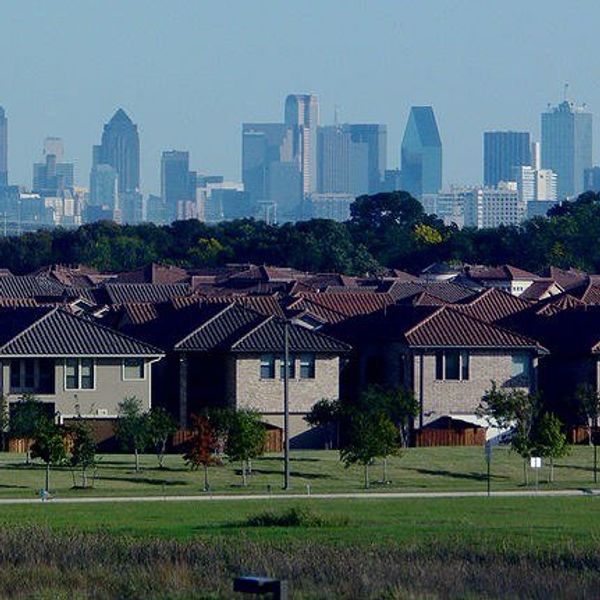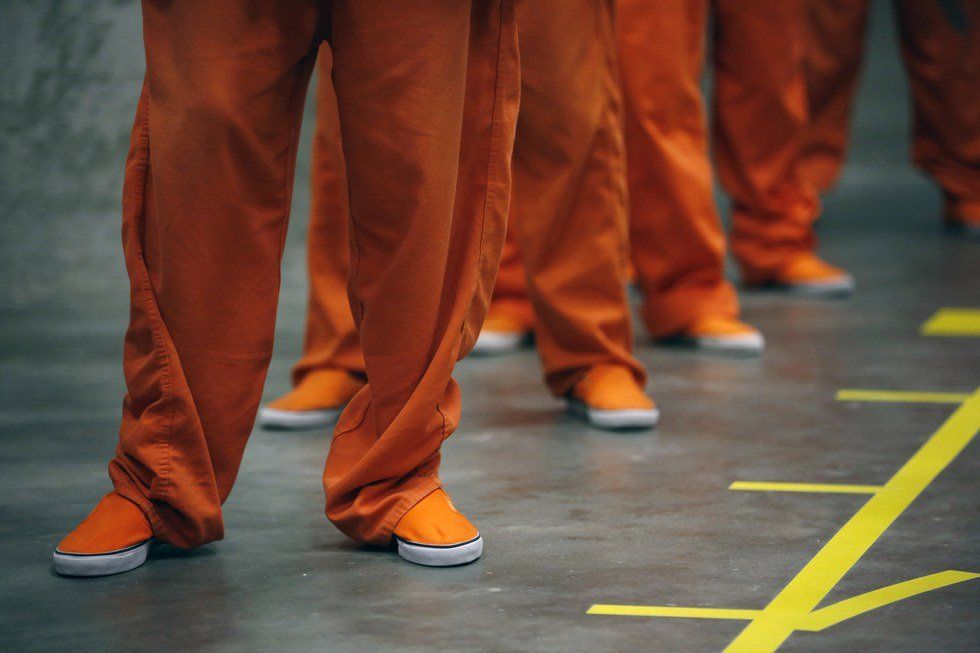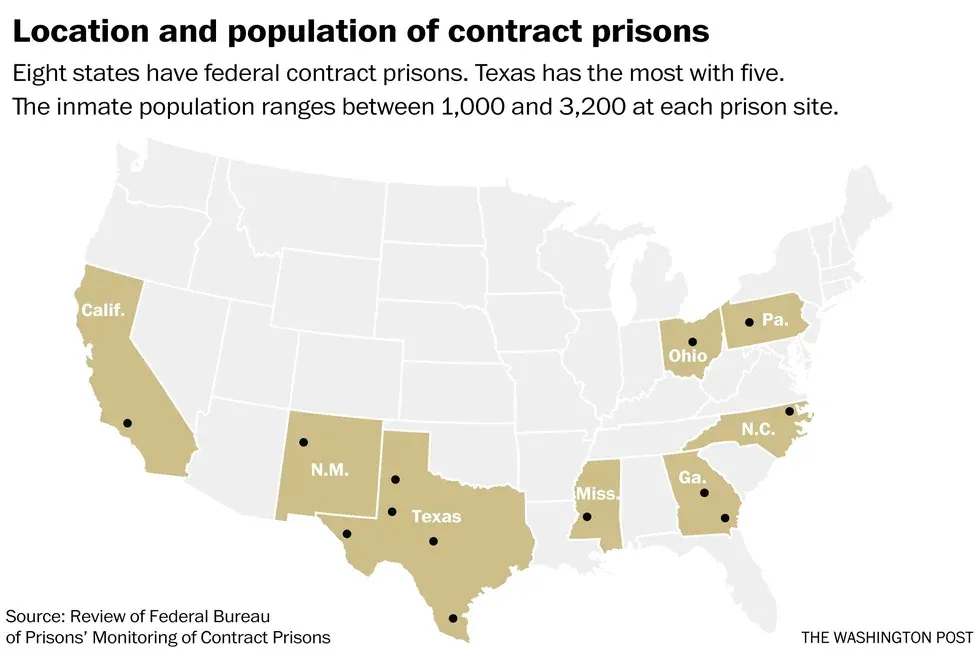The Department of Justice's recent decision to phase out the use of private prisons was a ground-breaking one that signifies a huge step forward in terms of destroying the country's prison industrial complex. However, as terrible as these private prisons are, they are not the biggest problem facing the United States' criminal justice system today.
Deputy Attorney General, Sally Yates, stated in a memo on Thursday that, "[private prisons] simply do not provide the same level of correctional services, programs, and resources; they do not save substantially on costs; and as noted in a recent report by the Department's Office of Inspector General, they do not maintain the same level of safety and security [as public Bureau facilities]." Private, for-profit prisons encourage and exploit mass incarceration and criminalization, all for the chance to make a profit. While Yates' memo is true, the criminal justice system is not broken because there are too many people in private prisons, it is broken because there are too many people in all prisons. There are too many people locked up in general. Private prisons are only a result of mass incarceration. The US has the highest incarceration rate in the entire world, despite having less than 5 percent of the world population. According to the 2014 US Bureau of Justice Statistics report, the United States correctional system incarcerated over 2 million people (only 22,000 of which are held in private prisons), not to mention costs taxpayers about $80 billion each year.
The DOJ's plan to reduce and ultimately end the use of private prisons is a noble and just one, but this plan only affects the Federal Bureau of Prisons system. That's only 13 privately operated prisons in the entire 50 states, 5 of which are in Texas. There are around 130 total private prisons in the country.
The Bureau of Prisons began contracting with private prison corporations, like Corrections Corporation of America and GEO Group, in the 1990s as an attempt to curb overcrowding due to the massive crime wave that swept the nation in the 80s. These corporations also control many of the country's immigration detention centers that hold over 60 percent of all immigrant detainees. With immigration on the rise, the rate of immigration detention is rising as well. This will lead to increased safety hazards and poor health conditions.
This plan to contract with private prison corporations as an attempt to stop mass incarceration and drug crimes proves costly, and more people are incarcerated for nonviolent crimes. These contracts often guarantee that states will keep their facilities at 80 to 100 percent capacity. If they fail to do this, the state must pay a fine to the company in charge of the prison, so the state is paying for each bed regardless of whether someone is sleeping in it or not. This incentivizes states to lock more people up in private prisons versus government-run prisons, regardless of the prison's security and health conditions, and location to prisoners' families. In order to save money that they lose from contracts like this, private prison companies cut re-entry and educational programs that would reduce recidivism, and often support mass incarceration.
In addition to these "bed guarantee" contracts, many law enforcement agencies use a policing method that is number-based. This means officers are paid more for reaching high arrest quotas. This incentivizes law enforcement to make lots of low-level arrests rather than focusing on violent crimes. These arrests have the highest effect on poor people and people of color, most predominately poor black men.
According to Michelle Alexander, author of "The New Jim Crow: Mass Incarceration in the Age of Colorblindness," "the United States imprisons a larger percentage of its black population than South Africa did at the height of apartheid…In the District of Columbia, [for example,] it is estimated that three out of four young black men (and nearly all those in the poorest neighborhoods) can expect to serve time in prison." The stereotype insisting that black men are "dangerous thugs" and "violent criminals" is largely to blame for the disproportionate number of incarcerations of these men. However, this false stereotype is merely a facade hiding the racist history that has plagued the United States for its entire existence.
Institutions such as Jim Crow Laws, ghettos, slavery and more presently, mass incarceration instil the idea of race. They racialize African-Americans, and deem them as different, and therefore, bad. To clarify, when slavery was legal, people had the idea that African-Americans were not only dangerous, but also inferior to white people. This provided white people justification for thinking that black people needed to be locked up and restrained by those who had superiority over them, while still satisfying their need for slave labor and their commitment to democracy and civil justice. Jim Crow continued to fuel this white superiority complex by keeping black people segregated from whites, and ghettos prevented black people from migrating from the North after the Civil War. Mass incarceration does the same thing: it keeps white supremacy alive. It reinforces the lie that blackness equals violence and criminality. Mass incarceration allows white people to preserve their false sense of moral superiority by claiming that people of color are "destroying" America. Once these people are locked up, then they are even further burdened by the fact that many of them are no longer able to receive Medicaid, public housing, Section 8 vouchers, food stamps, veterans' benefits and other forms of assistance.
In 39 states, convicts on probation are not allowed to vote; in 42 states, convicts are not allowed to vote while in prison; and in 3 states, ex-felons cannot vote for their entire life. 1 in 8 black men is currently being disenfranchised because of their criminal history. According to Dan Froomkin of the Huffington Post, "[a]n estimated 5.3 million Americans are denied the right to vote based on their felony convictions, 4 million of whom are out of prison. About a third of them are black, including 13 percent of all African-American men." Black men are the most incarcerated population, so they are the ones most affected by this disenfranchising. This completely wipes out an entire section of American people and shuts down the black vote, which again further fuels the country's disgusting white superiority complex.
The 22,000 federal inmates in the Bureau's private prisons are not getting released; they're not going to just disappear. They're going to be relocated from said private prisons to government operated ones. This doesn't solve the overcrowding issue, and it doesn't solve the safety issue either. If we're simply taking these people out of one prison and putting them into another one that is already at capacity or overcapacity, then we're making it harder for each prisoner to access resources they need to survive incarceration. More people means less food, less space and more violence. In order to reduce mass incarceration, improve racial tensions and spend taxpayer money more resourcefully, policy makers should rethink these financial investments and focus funding more on things that improve and support public safety, as well as address the country's ever-present struggle with white superiority.






















